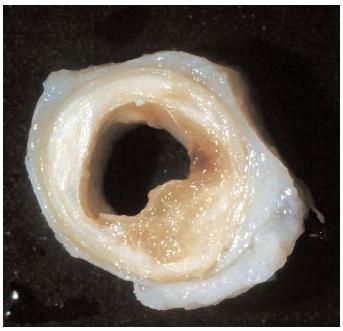High cholesterol is one of the major risk factors for coronary artery disease, heart attacks, and strokes. It also appears to boost the risk of Alzheimer's disease. High cholesterol leads to a buildup of plaque that narrows the arteries. This is dangerous because it can restrict blood flow. If the blood supply to a part of the heart or brain is completely cut off, the result is a heart attack or stroke.
See the pic below? Looks like the cross section of vertebrate from someones spine right? Wrong, its actually the cross section of a heavily diseased and calcified coronary artery. Gulp! Look at all that build up of plaque (one of the most common cause of death worldwide.) Risk factors for the disease include poor diet, cigarette smoking, and stress.

People older than 20 should have their cholesterol levels checked at least once every five years. This is done with a simple blood test known as a fasting lipoprotein profile. It measures the different forms of cholesterol that are circulating in your blood after you avoid eating for nine to 12 hours. The results show your levels of "bad" cholesterol, "good" cholesterol, and triglycerides.
'Bad' Cholesterol
Most of the cholesterol in the blood is carried by proteins called low density lipoproteins or LDL. This is known as the bad cholesterol because it combines with other substances to clog the arteries. A diet high in saturated fats and trans fats tends to raise the level of LDL cholesterol. For most people, an LDL score below 100 is healthy, but people with heart disease may need to aim even lower.
Good' Cholesterol
Up to a third of blood cholesterol is carried by high-density lipoproteins or HDL. This is called good cholesterol because it helps remove bad cholesterol, preventing it from building up inside the arteries. The higher the level of HDL cholesterol, the better. People with too little are more likely to develop heart disease. Eating healthy fats, such as olive oil, may help boost HDL cholesterol.
Diet changes offer a powerful way to fight high cholesterol. If you've ever wondered why some cereals claim to be heart-healthy, it's the fiber. The soluble fiber found in many foods helps reduce LDL, the bad cholesterol. Good sources of soluble fiber include whole-grain breads and cereals, oatmeal, fruits, dried fruits, vegetables, and legumes such as kidney beans.
No more than 35% of your daily calories should come from fat. But not all fats are equal. Saturated fats -- from animal products and tropical oils -- raise LDL cholesterol. Trans fats carry a double-whammy, boosting bad cholesterol, while lowering the good kind. These two bad fats are found in many baked goods, fried foods (doughnuts, fries, chips), stick margarine, and cookies. Unsaturated fats may lower LDL when combined with other healthy diet changes. They're found in avocados, olive oil, and peanut oil.
Some studies suggest garlic can knock a few percentage points off total cholesterol. But garlic pills can have side effects and may interact with medications. Other herbs that may reduce cholesterol and dissolve plaque include:
Garlic
Oats and Bran
Olive Oil
Fenugreek seeds
Artichoke leaf extract
Yarrow
Holy basil
Green tea can also protect heart arteries by keeping them flexible and relaxed, helping the organ from the ups and downs of constant changes in blood pressure. A study using this delicious herbal beverage showed that when doctors measured green tea drinkers' arteries a fortnight after a few weeks daily consumption of the tea, they found that their vessels were more dilated than they had been at the beginning of the study.
Apples are great too at reducing cholesterol too. Its all about the soluble fibre in them, fibre that binds with fats in the intestine, lowering your cholesterol levels. It also helps to slow the build up of pesky plaque in your arteries, preventing it from solidifying on your artery walls. I find myself eating three or four apples a day since learning this.
I also find it pretty satisfying to see videos like the one below, seeing that horrid plaque get removed. Ah the marvel of modern surgery, we are truly blessed to live in such an age.
